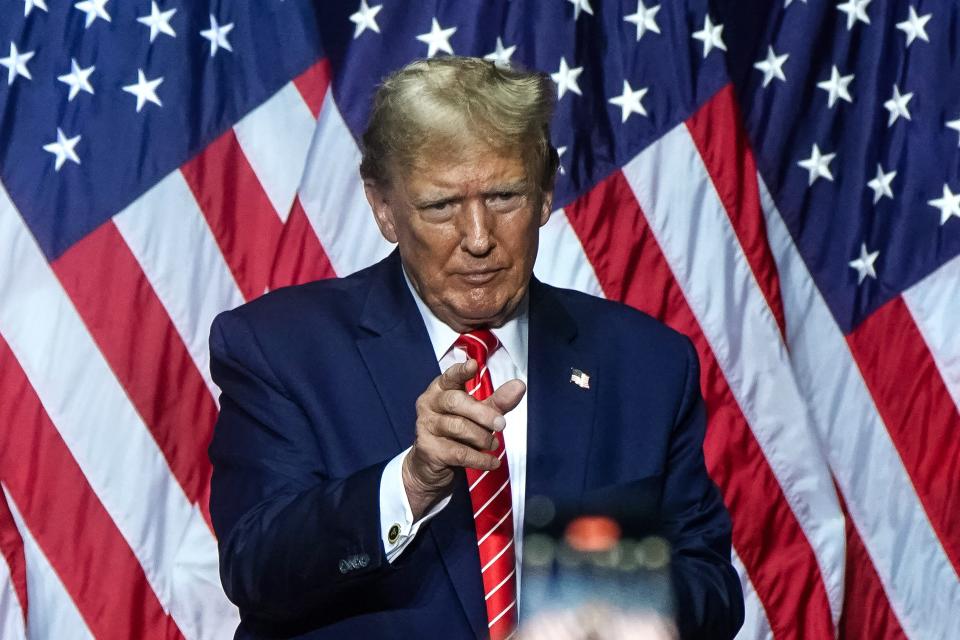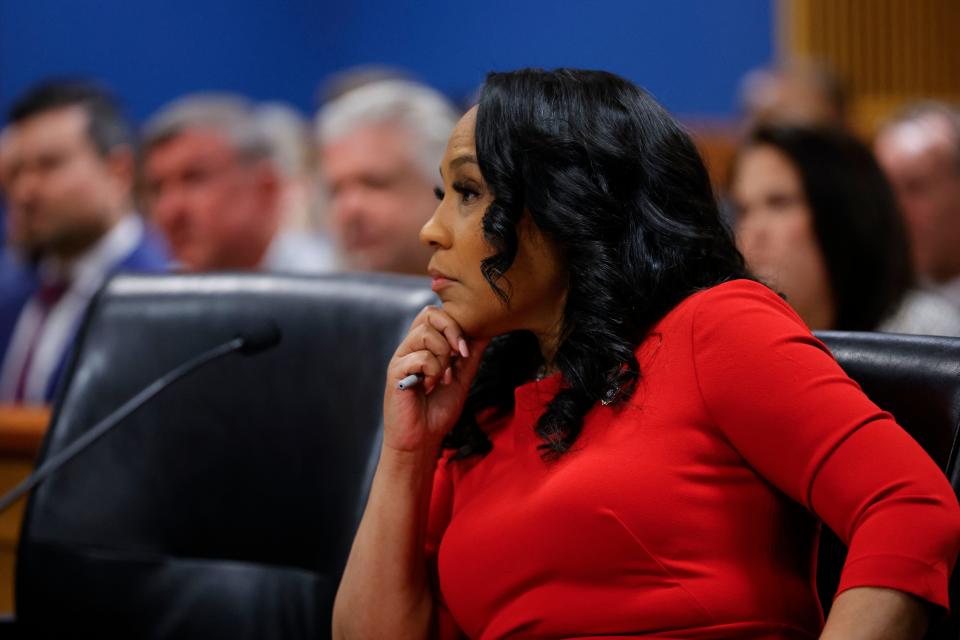Fake electors indicted in Arizona: Here's how Trump's plan to overturn the election worked
- Oops!Something went wrong.Please try again later.
WASHINGTON — A grand jury charged 11 Arizona Republicans and seven former aides to former President Donald Trump with crimes including and forgery for falsely certifying he won the state in 2020 on Wednesday. It is the latest in a series of state and federal criminal indictments stemming from the Trump campaign's "fake elector" scheme to overturn the 2020 election.
Trump and his allies allegedly devised a plan to recruit fake electors to replace legitimate presidential electors in key battleground states and reverse Trump's loss, according to state indictments in Georgia, Michigan, and Arizona and a federal indictment in Washington, D.C.
Here's a closer look at the plot:
Who are electors?
Presidential elections are determined by the Electoral College. All electors meet in their states to collect the results of the presidential election and to send their votes to Congress for certification the month after a presidential election. Each candidate has a slate of electors who have pledged to vote for that candidate.
Technically, voters actually choose electors for their preferred presidential candidate, rather than the candidate herself. The electors for the candidate who wins the plurality of votes in a state then cast Electoral College votes on behalf of that candidate, except in Maine and Nebraska, in which the two electors corresponding to the state's two Senate seats vote for the winner, while the rest correspond to congressional districts and vote for the winner of the vote in the district.
The Constitution and federal laws provide general requirements for elector selection. Electors cannot be members of Congress, hold high-level federal positions or have engaged in an insurrection or rebellion against the U.S.

What was the fake electors scheme?
After the Trump campaign's efforts to overturn his losses in key swing states were defeated in court, his campaign hatched a plot to draft alternative slates of electors in seven states Biden carried: Arizona, Georgia, Michigan, Nevada, New Mexico, Pennsylvania and Wisconsin.
Trump's electors met on Dec. 17 to cast fraudulent votes for Trump and sign certificates falsely claiming they were legitimate electors, which they sent to the National Archives and Congress. The watchdog group American Oversight has published some of the fake certificates.
Trump and his allies pressured then-Vice-President Mike Pence to use the fake elector certificates to refuse to certify Biden's Electoral College victory during the joint session of Congress on Jan. 6., 2021 on the grounds that there were competing slates of electors and doubt as to which should be counted.
“We would just be sending in ‘fake’ electoral votes to Pence so that ‘someone’ in Congress can make an objection when they start counting votes, and start arguing that the ‘fake’ votes should be counted,” Jack Wilenchik, an Arizona-based pro-Trump lawyer based in Arizona, wrote in an email to Trump advisor Boris Epshteyn.
Electors who have been indicted for their role in this scheme include former Arizona Republican Chair Kelli Ward and Arizona Republican state Sens. Jake Hoffman and Anthony Kern, Georgia Republican Party Chair David Shafer, and Michigan GOP National Committeewoman Kathleen Berden.

The 1960 precedent
In 1960, the results of the vote count in Hawaii remained in dispute as Dec. 14 approached, to meet and cast its votes drew near. A recount was underway but it did not appear as though it would be completed by the time the Electoral College was expected to convene, on Dec. 19, 1960.
Republican Vice-President Richard Nixon claimed was leading and the governor formally certified a slate of electors declaring him the victor, but Sen. John F. Kennedy's campaign drafted an alternate slate of electors. Kennedy electors ended up being certified by the governor after Kennedy won a recount.
The Trump campaign claimed this as a precedent for their alternative elector slates. However, historians have noted several differences: Hawaii's competing elector slates were chosen in public, while Trump's were in secret, and there was an ongoing recount in Hawaii in 1960, whereas all seven states Trump tried to overturn had unequivocally determined Biden won.
What charges do Trump and his allies face?
The federal 2020 election indictment charges Trump with four felony counts: conspiracy to defraud the U.S., conspiracy to obstruct an official proceeding on Jan. 6, 2021, obstruction of and attempt to obstruct an official proceeding and conspiracy against rights.
The Georgia indictment charged Trump and 18 of his allies with violating Georgia's Racketeer Influenced and Corrupt Organizations, or RICO, Act for a pressure campaign on state election workers, a scheme to use so-called fake electors and more. Four defendants have pleaded guilty, including Trump lawyers Kenneth Chesebro, Jenna Ellis, and Sydney Powell.
Trump and his allies such as former White House Chief of Staff Mark Meadows and former New York City Mayor Rudy Giuliani also face other charges in the Georgia indictment, including conspiracy to commit forgery in the first degree, and solicitation of violation of oath by public officer.
In the federal election subversion case, Trump faces four felony charges: conspiracy to defraud the United States, conspiracy to obstruct an official proceeding, obstruction of and attempt to obstruct an official proceeding, and conspiracy against rights.
Contributing: John Fritze
This article originally appeared on USA TODAY: Details of fake elector allegations against Trump, allies in Arizona

